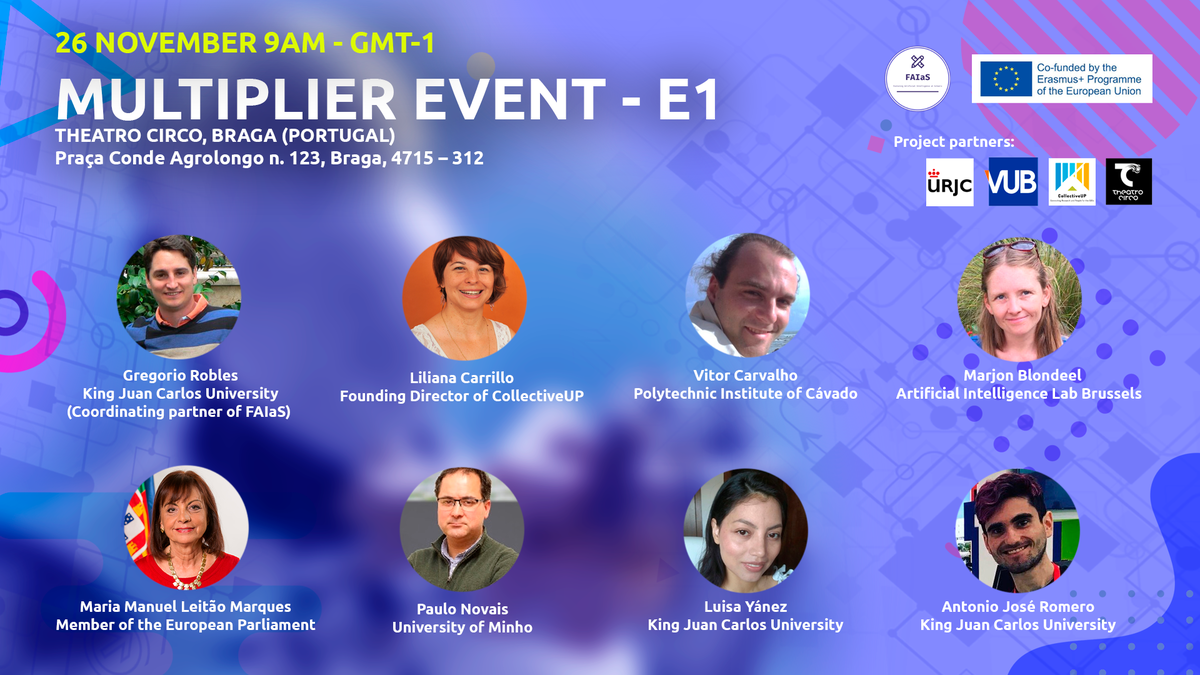For a better understanding of what Artificial Intelligence is and how it can be used (or misused) in education and training
Multiplier Event 1

In the last 10 years, Artificial Intelligence (AI) has been transforming the economy, our work methods, and pastimes in visible and invisible ways. And, we will increasingly be supported by and interact with technology that is powered by Artificial Intelligence. It is important to realize that not only technical careers will be impacted by this evolution, but almost every profession, ranging from historians, marketeers, healthcare workers to teachers will be changing. Every day, new AI platforms are being developed to support students and teachers tasks, but we are so busy with our daily tasks that we do not have time, or do not make time free to learn about those new trends. That is why the Erasmus+ project FAIaS (Fostering AI at Schools) has been launched, to bridge that knowledge gap and make it easy for the educational sector (schools, teachers, students and policy makers) to understand AI. The goal of FAIaS is to create easy content for teachers and students to learn about AI: learn what it is, where it is implemented, how to use it, how to create it, and also understand the positive and negative ways in which AI can impact our lives.
Format:
On-site event
Speakers:
-
Gregorio Robles, Coordinating partner of FAIaS & Full Professor at Universidad Rey Juan Carlos. Linkedin
-
Paulo Novais, Professor of Computer Science at the Department of Informatics, in the School of Engineering of the University of Minho Linkedin
-
Vitor Carvalho, Professor and Researcher at IPCA //Member of the Commission’s Expert Group on Artificial Intelligence and Data in Education and Training at the European Commission Linkedin
-
Maria Manuel Leitão Marques, Member of the European Parliament and Member of the Special Committee on Artificial Intelligence in the Digital Age AIDA
-
Liliana Carrillo, Founding Director of CollectiveUP, co-founder of the European Digital Development Alliance and co-founder of Shine Your Light Linkedin
-
Marjon Blondeel,AI Engineer at Artificial Intelligence Lab Brussels Linkedin
-
Luisa Yánez, Telecommunications engineer & Data Scientist Linkedin
-
Antonio José Romero Barrera, Linkedin
Program:
-
9:00 Registration and networking moment
-
10:00 Welcome and Opening remarks
-
10:15 Presentation of the FAIaS project - Fostering Artificial Intelligence at Schools//programme and expected outcomes,
Gregorio Robles [Coordinating partner of FAIaS & Full Professor at Universidad Rey Juan Carlos] -
10:30 Paulo Novais “Ethics for robots and other philosophical challenges of Artificial Intelligence in education” [Professor of Computer Science at the Department of Informatics, in the School of Engineering of the University of Minho]
-
11:15 Coffee break
-
11:45 “An Artificial Intelligence centered on trust”
Vitor Carvalho [ Professor and Researcher at IPCA //Member of the Commission’s Expert Group on Artificial Intelligence and Data in Education and Training at the European Commission]
Maria Manuel Leitão Marques [Member of the European Parliament and Member of the Special Committee on Artificial Intelligence in the Digital Age AIDA] *online
Liliana Carrillo [Founding Director of CollectiveUP, co-founder of the European Digital Development Alliance and co-founder of Shine Your Light ]
-
13:00 Lunch
-
14:30 Workshops
Workshops:
Workshop 1 - In a Reinforcement Learner agent’s shoes
Who : Marjon Blondeel Vrije Universiteit Brussel
Description: Reinforcement Learning is currently one of the most popular subfields of Artificial Intelligence. It is sometimes called the science of decision making and it is the driving force behind autonomous vehicles. In essence a self-driving car learns how to drive on its own by trial and error using feedback following its own actions, just like we humans learn how to ride a bike. In this workshop we will take away some of the mystery behind the technique and also learn a task ourselves using Reinforcement Learning.
Workshop 2 - Discovering our unconscious bias
Who: Liliana Carrillo, CollectiveUP
Description: Our experiences, and who we are, shape the way we see the world and these influence the decisions we make. Each person has a somewhat different view of the world, and each person has some tendencies, inclinations or prejudice towards/against something or someone, and that is called bias. We are all (unconsciously) biased! Some biases are positive and helpful as they keep us safe, but some others are based on stereotypes and can lead us to discriminatory practices. No worries! we are here to learn. This workshop explains what implicit bias is, why we are biased, how it is different from overt bias, how to recognize our own bias, and get some tips to overcome your bias.
Workshop 3 - LearningML
Who: Luisa Yánez, Universidad Rey Juan Carlos
Description: LearningML is a web platform aimed at using supervised machine learning, one of the most successful AI techniques that is at the base of almost all current AI applications, in education. It has been designed with a low-floor idea, that allows users to use it even with minor knowledge of computers and AI, in general. It offers the possibility to classify texts, images and sounds. And for the most advanced users, you can integrate the machine learning models they create into their Scratch programs easily.
Workshop 4 - Moral Machine
Who: Antonio J. Romero Universidad Rey Juan Carlos Madrid
Description: Moral Machine is an online platform, developed at the Massachusetts Institute of Technology, that generates moral dilemmas and collects information on the decisions that people make between two destructive outcomes. The presented scenarios are often variations of the trolley problem, and the information collected would be used for further research regarding the decisions that machine intelligence must make in the future. For example, as artificial intelligence plays an increasingly significant role in autonomous driving technology, research projects like Moral Machine help to find solutions for challenging life-and-death decisions that will face self-driving vehicles.